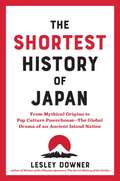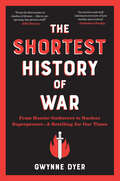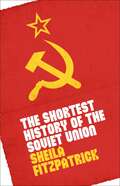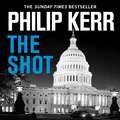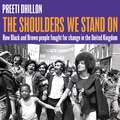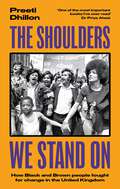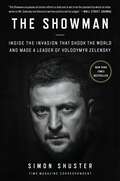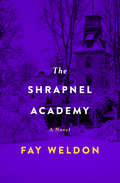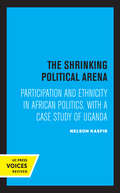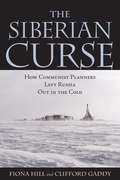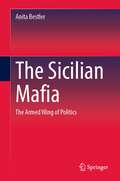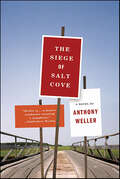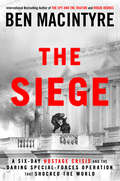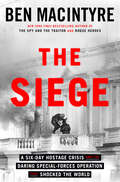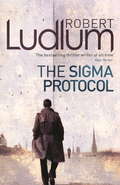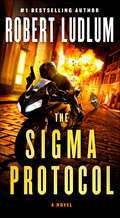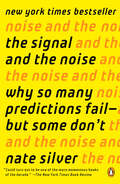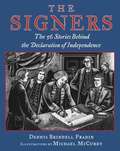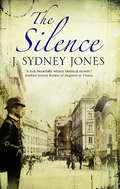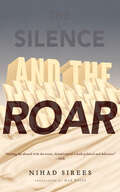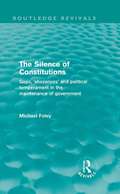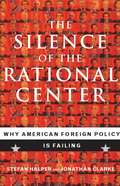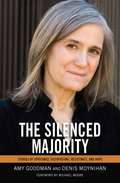- Table View
- List View
The Shortest History of Japan: From Mythical Origins to Pop Culture Powerhouse - The Global Drama of an Ancient Island Nation (The Shortest History Series #0)
by Lesley DownerDiscover the aesthetic traditions, political resilience, and modern economic might of this singular island nation. The Shortest History books deliver thousands of years of history in one riveting, fast-paced read. Zen, haiku, martial arts, sushi, anime, manga, film, video games . . . Japanese culture has long enriched our Western way of life. Yet from a Western perspective, Japan remains a remote island country that has long had a complicated relationship with the outside world. Japan—an archipelago strung like a necklace around the Asian mainland—is considerably farther from Asia than Britain is from Europe. The sea has provided an effective barrier against invasion and enabled the culture to develop in unique ways. During the Edo period, the Tokugawa shoguns successfully closed the country to the West. Then, Japan swung in the opposite direction, adopting Western culture wholesale. Both strategies enabled it to avoid colonization—and to retain its traditions and way of life. A skilled storyteller and accurate historian, Lesley Downer presents the dramatic sweep of Japanese history and the larger-than-life individuals—from emperors descended from the Sun Goddess to warlords, samurai, merchants, court ladies, women warriors, geisha, and businessmen—who shaped this extraordinary modern society.
The Shortest History of War: From Hunter-gatherers To Nuclear Superpowers--a Retelling For Our Times (Shortest History #0)
by Gwynne DyerA brisk account of this defining feature of human society, from prehistory to nuclear proliferation and lethal autonomous weapons. The Shortest History books deliver thousands of years of history in one riveting, fast-paced read. War has changed, but we have not. From our hunter-gatherer ancestors to the rival nuclear powers of today, whenever resources have been contested, we’ve gone to battle. Acclaimed historian Gwynne Dyer illuminates our many martial clashes in this brisk account, tracing warfare from prehistory to the world’s first cities—and on to the thousand-year “classical age” of combat, which ended when the firearm changed everything. He examines the brief interlude of “limited war” before eighteenth-century revolution ushered in “total war”—and how the devastation was halted by the nuclear shock of Hiroshima. Then came the Cold War and Russia’s invasion of Ukraine, which punctured the longest stretch of peace between major powers since World War II. For all our advanced technology and hyperconnected global society, we find ourselves once again on the brink as climate change heightens competition for resources and superpowers stand ready with atomic bombs, drones, and futuristic “autonomous” weapons in development. Throughout, Dyer delves into anthropology, psychology, and other relevant fields to unmask the drivers of conflict. The Shortest History of War is for anyone who wants to understand the role of war in the human story—and how we can prevent it from defining our future.
The Shortest History of the Soviet Union
by Sheila FitzpatrickIn 1917, Bolshevik revolutionaries came to power in the war-torn Russian Empire in a way that defied all predictions, including their own. Scarcely a lifespan later, in 1991, the Soviet Union collapsed as accidentally as it arose. The decades between witnessed drama on an epic scale—the chaos and hope of revolution, famines and purges, hard-won victory in history’s most destructive war, and worldwide geopolitical conflict, all entwined around the dream of building a better society.This book is a lively and authoritative distillation of this complex history, told with vivid details, a grand sweep, and wry wit. The acclaimed historian Sheila Fitzpatrick chronicles the Soviet Age—its rise, reign, and unexpected fall, as well as its afterlife in today’s Russia. She underscores the many ironies of the Soviet experience: An ideology that claimed to offer humanity the reins of history wrangled with contingency. An avowedly internationalist and anti-imperialist state birthed an array of nationalisms. And a vision of transcending economic and social inequality and injustice gave rise to a country that was, in its way, surprisingly normal.Moving seamlessly from Lenin to Stalin to Gorbachev to Putin, The Shortest History of the Soviet Union provides an indispensable guide to one of the twentieth century’s great powers and the enduring fascination it still exerts.
The Shot: Darkly imaginative alternative history thriller re-imagines the Kennedy assassination myth
by Philip KerrDarkly imaginative alternative history thriller from the global bestseller and author of the Bernie Gunther thrillers.America, 1960. In Washington, DC, John F Kennedy has just been elected President. In Havana, Fidel Castro has been in office for a year, and with Cold War tensions rapidly heating up and the Soviets leading the space race, the thought of a Communist leader so close to home is already raising American blood pressure. Anti-communist fever is rampant in the USA, with a paranoid establishment seeing reds under every bed. Nevertheless, the decision to snuff out the threat of Castro by hiring Tom Jefferson, America's best assassin, to kill him comes from an unusual quarter: the Mafia.But Jefferson's very skillset that makes him the perfect man for this job also ensures he has no qualms in double crossing his criminal paymasters. Jefferson has no issue with Castro: his preferred target is someone much closer to home...'Mind boggling ... keeps you guessing until the end' Sunday Express(P) 2020 Quercus Editions Limited
The Shoulders We Stand On: How Black and Brown people fought for change in the United Kingdom
by Preeti DhillonThe forgotten history of the UK's anti-racist campaigners are finally brought to life in this comprehensive account of modern British history, told through ten momentsThe United Kingdom is currently a hellscape for Black and Brown people. To be fair, things have never been great. Black and Brown people and allies alike, are asking ourselves a difficult question: what leads to real change?Have you heard of the Indian Worker's Association, Asian Youth Movements, the Grunwick Strike, the Brixton Black Women's Group, the Bristol Bus Boycott or the Battle of Brick Lane? If the answer is no, you're not alone. This is history that has been deliberately kept from us. It's time to reclaim these vital moments and find out how we can learn from our own collective past.A respected researcher and historian, Preeti Dhillon tells the stories of ten remarkable movements, campaigns and organisations led by Black and Brown people in from the sixties to the eighties that fought against racism and capitalism and impacted the way we live now. The Shoulders We Stand On is a book of hope. Hope that together we can make a difference, that together we are powerful, and that we don't have to tackle this alone. There is a long and deep history of activism by Black and Brown people. Their stories can inspire all of us to make a difference just as they did. We're not alone, we've been here before and this is the book we all need now.Filled with inspiring stories Preeti Dhillon uncovers crucial moments from our history. If you loved Natives, Brit(ish), Small Axe or Pride, don't miss The Shoulders We Stand On.(P) 2023 Little Brown Book Group Limited for and on behalf of Dialogue Books
The Shoulders We Stand On: How Black and Brown people fought for change in the United Kingdom
by Preeti DhillonThe UK is grappling with big questions about belonging, equality, and the legacies of Empire and Colonialism. We've been here before. Embracing a broader history that encompasses all British people, The Shoulders We Stand On is fundamental to a better understanding of the past and gives many more people who fought for our future a voice in the present.Have you heard of the Indian Workers' Association? The Grunwick Strike? The Brixton Black Women's Group? The Battle of Brick Lane? If the answer is no, you're not alone. The Shoulders We Stand On tells the stories of ten remarkable movements, campaigns and organisations led by Black and Brown people across Britain from the sixties to the eighties that fought against racism and capitalism and impacted the way we live now.Researcher and historian Preeti Dhillon wants us to reclaim the history that has been kept from us, and use these vital movements and inspirational moments to better understand the UK we live in today and how change happens.There is a long and deep history of activism by Black and Brown people spanning the UK. Their stories can inspire all of us to make a difference, just as they did. The Shoulders We Stand On is a book of hope. Hope that together we can make a difference, that together we are powerful, and that we don't have to tackle society's challenges alone.We're not alone, we've been here before and this is the book we all need now.Filled with inspiring narratives, Preeti Dhillon uncovers crucial moments from our history. If you loved the books Natives and Brit(ish), the TV series Small Axe or the film Pride, don't miss The Shoulders We Stand On.
The Showman: Inside the Invasion That Shook the World and Made a Leader of Volodymyr Zelensky
by Simon ShusterINSTANT NEW YORK TIMES BESTSELLER!"Shuster crafts an intimate account of the Russian invasion, which vividly captures Zelensky’s transformation from a clean-cut funnyman into a war hero out of central casting." --New York Times Book Review; Editors' Choice Selection“The Showman surpasses all similar efforts to date and is set to be the standard by which all other works on Mr. Zelensky and Ukraine’s wartime politics will be judged." —Wall Street JournalA monumental account of Russia’s invasion of Ukraine and the forging of a leader, The Showman provides an insider’s perspective on the war reshaping our world, based on unprecedented access to Volodymyr Zelensky and the high command in Kyiv.Time correspondent Simon Shuster chronicles the life and leadership of Volodymyr Zelensky from the dressing rooms of his variety shows to the muddy trenches of Ukraine’s war with Russia. Based on four years of reporting; extensive travels with President Zelensky to the front; and dozens of interviews with him, his wife, his friends and enemies, his advisers, ministers and military commanders, Shuster tells the intimate and revealing story of the president’s evolution from a slapstick actor to a symbol of resilience.In their most candid accounts of the war so far, members of Zelensky’s inner circle show how the president’s character changed under the strains of leadership and the horrors he witnessed each day. His wife, First Lady Olena Zelenska, describes her escape from Kyiv with their children, her life on the run, and the tensions that emerged in her marriage as she struggled to return to a meaningful role in the administration. Ukraine’s top military commander, General Valery Zaluzhny, shares the untold story of his fraught relationship with the president and the subsequent consequences.Reflecting on their own regrets and critical decisions, Zelensky and his senior aides open up about the causes of the Russian invasion and how it may have been avoided. They describe with astonishing frankness how their peace talks with Vladimir Putin fell apart and how their faith in the U.S. faltered, both under Donald Trump and Joe Biden.The Showman provides the first inside account of Zelensky’s life amid the invasion, offering a clear-eyed view of his failures to prepare for it and his willingness to silence dissent under martial law. What emerges is a complex picture of a man struggling to break what he sees as a historical cycle of oppression that began generations before he was born. Even as the war drags on, Zelensky lays out his vision for its future course and, through his actions, demonstrates his strategy for countering the Russians and keeping the West on his side.The Showman, as a work of eyewitness journalism, provides an essential perspective on the war defining our age, resulting in a riveting, vivid portrait of the invasion as experienced by its number one target and improbable hero.
The Shrapnel Academy: A Novel (Dales Large Print Ser.)
by Fay WeldonA weekend in the country erupts into a free-for-all of mutiny, sex, and murder On the anniversary of the Eve of the Battle of Waterloo, an assortment of unusual dinner guests gather at a remote country house to pay homage to Henry Shrapnel, inventor of the exploding cannonball. But all is not peaceful at the Shrapnel Academy: The downstairs servants, a group of third-world refugees led by a South African butler, are plotting to overthrow their upstairs oppressors. When a blizzard hits the countryside and traps everyone indoors, the rebellion erupts into bloody warfare throughout the Academy, &“a shrine to the ethos of military excellence.&” With characters that include a domineering female sergeant, a war-mongering general, a brain-damaged spy, and an idiot-savant arms dealer, Fay Weldon gives us a country house novel replete with sexual atrocity and class warfare. No one will emerge unscathed in this stinging tale of modern-day barbarians, where the deadliest weapons are the ever-raging battles between the haves and the have-nots.
The Shrinking Political Arena: Participation and Ethnicity in African Politics, with a Case Study of Uganda
by Nelson KasfirThis title is part of UC Press's Voices Revived program, which commemorates University of California Press’s mission to seek out and cultivate the brightest minds and give them voice, reach, and impact. Drawing on a backlist dating to 1893, Voices Revived makes high-quality, peer-reviewed scholarship accessible once again using print-on-demand technology. This title was originally published in 1976.
The Shriver Report: A Woman's Nation Pushes Back from the Brink
by Maria Shriver The Center for American ProgressFacts, figures, and essays on women and poverty by Barbara Ehrenreich, Kirsten Gillibrand, LeBron James, and other high-profile contributors. Fifty years after President Lyndon B. Johnson called for a War on Poverty and enlisted Sargent Shriver to oversee it, the most important social issue of our day is once again the dire economic straits of millions of Americans. One in three live in poverty or teeter on the brink—and seventy million are women and the children who depend on them. The fragile economic status of millions of American women is the shameful secret of the modern era—yet these women are also our greatest hope for change, and our nation&’s greatest undervalued asset. The Shriver Report: A Woman&’s Nation Pushes Back from the Brink asks—and answers—big questions. Why are millions of women financially vulnerable when others have made such great progress? Why are millions of women struggling to make ends meet even though they are hard at work? What is it about our nation—government, business, family, and even women themselves—that drives women to the financial brink? And what is at stake? To forge a path forward, this book brings together a power-packed roster of big thinkers and talented contributors, in a volume that combines academic research, personal reflections, authentic photojournalism, groundbreaking poll results, and insights from frontline workers; political, religious, and business leaders; and major celebrities—all focused on a single issue of national importance: women and the economy. &“A startling wake-up call for policymakers and anyone hoping to survive a culture that siphons wealth upward to a very powerful few.&” —Booklist Contributors include: Carol Gilligan, PhD * Barbara Ehrenreich * Beyoncé Knowles-Carter * LeBron James * Anne-Marie Slaughter * Kirsten Gillibrand * Hillary Rodham Clinton * Tory Burch * Sister Joan Chittister * Arne Duncan * Kathleen Sibelius * Howard Schultz * and more!
The Siberian Curse
by Fiona Hill Clifford G. GaddyCan Russia ever become a normal, free-market, democratic society? Why have so many reforms failed since the Soviet Union's collapse? In this highly-original work, Fiona Hill and Clifford Gaddy argue that Russia's geography, history, and monumental mistakes perpetrated by Soviet planners have locked it into a dead-end path to economic ruin. Shattering a number of myths that have long persisted in the West and in Russia, The Siberian Curse explains why Russia's greatest assets--its gigantic size and Siberia's natural resources--are now the source of one its greatest weaknesses. For seventy years, driven by ideological zeal and the imperative to colonize and industrialize its vast frontiers, communist planners forced people to live in Siberia. They did this in true totalitarian fashion by using the GULAG prison system and slave labor to build huge factories and million-person cities to support them. Today, tens of millions of people and thousands of large-scale industrial enterprises languish in the cold and distant places communist planners put them--not where market forces or free choice would have placed them. Russian leaders still believe that an industrialized Siberia is the key to Russia's prosperity. As a result, the country is burdened by the ever-increasing costs of subsidizing economic activity in some of the most forbidding places on the planet. Russia pays a steep price for continuing this folly--it wastes the very resources it needs to recover from the ravages of communism. Hill and Gaddy contend that Russia's future prosperity requires that it finally throw off the shackles of its Soviet past, by shrinking Siberia's cities. Only by facilitating the relocation of population to western Russia, closer to Europe and its markets, can Russia achieve sustainable economic growth. Unfortunately for Russia, there is no historical precedent for shrinking cities on the scale that will be required. Downsizing Siberia will be a costly and wrenching process. But there is no alternative. Russia cannot afford to keep the cities communist planners left for it out in the cold.
The Siberian Curse
by Fiona Hill Clifford G. GaddyCan Russia ever become a normal, free-market, democratic society? Why have so many reforms failed since the Soviet Union's collapse? In this highly-original work, Fiona Hill and Clifford Gaddy argue that Russia's geography, history, and monumental mistakes perpetrated by Soviet planners have locked it into a dead-end path to economic ruin. Shattering a number of myths that have long persisted in the West and in Russia, The Siberian Curse explains why Russia's greatest assets--its gigantic size and Siberia's natural resources--are now the source of one its greatest weaknesses. For seventy years, driven by ideological zeal and the imperative to colonize and industrialize its vast frontiers, communist planners forced people to live in Siberia. They did this in true totalitarian fashion by using the GULAG prison system and slave labor to build huge factories and million-person cities to support them. Today, tens of millions of people and thousands of large-scale industrial enterprises languish in the cold and distant places communist planners put them--not where market forces or free choice would have placed them. Russian leaders still believe that an industrialized Siberia is the key to Russia's prosperity. As a result, the country is burdened by the ever-increasing costs of subsidizing economic activity in some of the most forbidding places on the planet. Russia pays a steep price for continuing this folly--it wastes the very resources it needs to recover from the ravages of communism. Hill and Gaddy contend that Russia's future prosperity requires that it finally throw off the shackles of its Soviet past, by shrinking Siberia's cities. Only by facilitating the relocation of population to western Russia, closer to Europe and its markets, can Russia achieve sustainable economic growth. Unfortunately for Russia, there is no historical precedent for shrinking cities on the scale that will be required. Downsizing Siberia will be a costly and wrenching process. But there is no alternative. Russia cannot afford to keep the cities communist planners left for it out in the cold.
The Sicilian Mafia: The Armed Wing of Politics
by Anita BestlerThis book offers a completely new approach to the complex social phenomenon of the Mafia: In addition to the origins, organization and actions of the Mafia, the author Anita Bestler examines above all the close connection between organized crime and politics. In the process, readers [also] gain an interesting insight into the complicated political development of Italy from the founding of the state to the present, as well as an answer as to why Italians have a different political mindset.
The Siege of Salt Cove: A Novel
by Anthony Weller"A gloriously strange book, both whimsical and brooding."—Jeremy Jackson, People The Commonwealth of Massachusetts has decided to replace Salt Cove's signature wooden bridge with a concrete monstrosity. The authorities are unreasoning and unyielding. The town decides on secession. Jessica Stoddard is a quirky seventy-two-year-old who is determined to keep a record of the event for posterity. She has a passion for the truth, but her account is not entirely reliable, because she also has a passion for the rebellion's ringleader who is...well, a much younger man. Toby Auberon is a lawyer and a drop-out. He has returned after years in Rio to perfect his mysterious invention in the solitude of the lighthouse. He is drawn, unwillingly, into the dispute when the bureaucracy switches tactics from bullying to armed occupation. Powerful, poignant, deeply funny, and enriched by the villagers' diverse voices, this is a contemporary farce about a town that dares to rebel against its own government, and to fight back when attacked.
The Siege: A Six-Day Hostage Crisis and the Daring Special-Forces Operation That Shocked the World
by Ben MacintyreA brilliant, seat-of-your-pants hostage-taking and daring SAS rescue mission of the Iran Embassy in London in 1980, this is Ben Macintyre at the very height of his story-telling powers.On April 30, 1980, six heavily armed gunmen burst into the Iranian embassy on Prince&’s Gate, overlooking Hyde Park in London. There, they took 26 hostages, including embassy staff, visitors, and three British citizens. A tense six-day siege ensued—all on television, over a Bank Holiday weekend—in which police negotiators and psychiatrists sought a bloodless end to the standoff, while the SAS laid plans for a daring rescue mission: Operation Nimrod.This mission marked a fundamental turning point in global history, when Middle Eastern terrorism arrived in the West. Britain had experienced IRA terrorism before, but never an international terrorist incident on this scale. It was a precursor to the brutal Iran-Iraq War that would follow, in which millions perished. Yet there exists to this day no full account of the week-long siege and gripping rescue.Drawing on interviews with police, hostages, terrorists and key SAS figures, and cutting through the sensationalism and misinformation, bestselling historian Ben Macintyre (author of Sunday Times #1s Colditz, The Spy and the Traitor and SAS: Rogue Heroes) goes deep into the archives with exclusive access to tell the story of what really happened and give the first definitive account of a moment that forever changed the way the nation thought about the SAS—and itself.
The Siege: A Six-Day Hostage Crisis and the Daring Special-Forces Operation That Shocked the World
by Ben Macintyre&“For six days, it was the Iranian Embassy on Princes Gate in London that riveted the world. . . . Macintyre&’s superb reconstruction restores it to vivid, complex life.&”—The Washington PostA thrilling tick-tock recounting one of the most harrowing hostage situations and daring rescue attempts of our time—from the true-life espionage master and New York Times bestselling author of Operation Mincemeat and The Spy and the Traitor.&“[Ben Macintyre is] John le Carré&’s nonfiction counterpart.&”—The New York TimesA BEST BOOK OF THE YEAR: The Washington Post, Minnesota Star Tribune, ParadeAs the American hostage crisis in Iran boiled into its seventh month in the spring of 1980, six heavily armed gunman barged into the Iranian embassy in London, taking twenty-six hostages. What followed over the next six days was an increasingly tense standoff, one that threatened at any moment to spill into a bloodbath. Policeman Trevor Lock was supposed to have gone to the theater that night. Instead, he found himself overpowered and whisked into the embassy. The terrorists never noticed the gun hidden in his jacket. The drama that ensued would force him to find reserves of courage he didn&’t know he had. The gunmen themselves were hardly one-dimensional—all Arabs, some highly educated, who hoped to force Britain to take their side in their independence battle against Supreme Leader Ayatollah Khomeini. Behind the scenes lurked the brutal Iraqi dictator Saddam Hussein, who had bankrolled the whole affair as a salvo against Iran.As police negotiators pressed the gunmen, rival protestors clashed violently outside the embassy, and as MI6 and the CIA scrambled for intelligence, Britain&’s special forces strike team, the SAS, laid plans for a dangerous rescue mission. Inside, Lock and his fellow hostages used all the cunning they possessed to outwit and outflank their captors. Finally, on the sixth day, after the terrorists executed the embassy press attaché and dumped his body on the front doorstep, the SAS raid began, sparking a deadly high-stakes climax.A story of ordinary men and women under immense pressure, The Siege takes readers minute-by-thrilling-minute through an event that would echo across the next two decades and provide a direct historical link to the tragedy on 9/11. Drawing on exclusive interviews and a wealth of never-before-seen files, Macintyre brilliantly reconstructs a week in which every day minted a new hero and every second spelled the potential for doom.
The Sigma Protocol
by Robert LudlumBen Hartman is on holiday in Switzerland when he meets a childhood friend - who promptly tries to kill him. In self-defence, Ben kills his attacker, but soon the body and all evidence of the confrontation have disappeared.Anna Navarro, a US government agent, is sent to look into a string of deaths around the world. The only thing the victims have in common is an old OSS file, codenamed SIGMA. But as soon as she starts to get somewhere, she is dragged off the case and declared rogue. Someone wants this secret kept, and not only the future of Hartman and Navarro is at stake, but that of the world...
The Sigma Protocol: A Novel
by Robert LudlumFrom a #1 New York Times–bestselling author, an agent escapes a hospital where the government held him hostage and finds he&’s not the man he thinks he is. On Parrish Island, a restricted island off the coast of Virginia, is a little-known and never-visited psychiatric facility. There, far from prying eyes, the government stores former intelligence employees whose psychiatric states make them a danger to their own government, people whose ramblings might endanger ongoing operations or prove dangerously inconvenient. One of these employees, former Consular Operations agent Hal Ambler, is kept heavily medicated and closely watched. But there's one difference between Hal and the other patients—Hal isn't crazy. With the help of a sympathetic nurse, Hal manages to clear his mind of the drug-induced haze and then pulls off a daring escape. Now he's out to discover who stashed him here and why—but the world he returns to isn't the one he remembers. Friends and longtime associates don't remember him, there are no official records of Hal Ambler, and, when he first sees himself in the mirror, the face that looks back at him is not the one he knows as his own. Praise for Robert Ludlum: &“Reading a Ludlum novel is like watching a James Bond film . . . slickly paced . . . all consuming.&” ―Entertainment Weekly &“Ludlum stuffs more surprises into his novels than any other six-pack of thriller writers combined.&” ―The New York Times &“Ludlum still dominates the field in adventure-drenched thrillers.&”—Chicago Tribune
The Signal and the Noise: Why So Many Predictions Fail-but Some Don't
by Nate SilverNate Silver built an innovative system for predicting baseball performance, predicted the 2008 election within a hair’s breadth, and became a national sensation as a blogger—all by the time he was thirty. He solidified his standing as the nation's foremost political forecaster with his near perfect prediction of the 2012 election. Silver is the founder and editor in chief of FiveThirtyEight.com.<P><P> Drawing on his own groundbreaking work, Silver examines the world of prediction, investigating how we can distinguish a true signal from a universe of noisy data. Most predictions fail, often at great cost to society, because most of us have a poor understanding of probability and uncertainty. Both experts and laypeople mistake more confident predictions for more accurate ones. But overconfidence is often the reason for failure. If our appreciation of uncertainty improves, our predictions can get better too. This is the “prediction paradox”: The more humility we have about our ability to make predictions, the more successful we can be in planning for the future.<P> In keeping with his own aim to seek truth from data, Silver visits the most successful forecasters in a range of areas, from hurricanes to baseball, from the poker table to the stock market, from Capitol Hill to the NBA. He explains and evaluates how these forecasters think and what bonds they share. What lies behind their success? Are they good—or just lucky? What patterns have they unraveled? And are their forecasts really right? He explores unanticipated commonalities and exposes unexpected juxtapositions. And sometimes, it is not so much how good a prediction is in an absolute sense that matters but how good it is relative to the competition. In other cases, prediction is still a very rudimentary—and dangerous—science.<P> Silver observes that the most accurate forecasters tend to have a superior command of probability, and they tend to be both humble and hardworking. They distinguish the predictable from the unpredictable, and they notice a thousand little details that lead them closer to the truth. Because of their appreciation of probability, they can distinguish the signal from the noise.<P> <P><b>A New York Times Bestseller</b> With everything from the health of the global economy to our ability to fight terrorism dependent on the quality of our predictions, Nate Silver’s insights are an essential read.
The Signers: The Fifty-Six Stories Behind the Declaration of Independence
by Dennis Brindell Fradin<p><i>“We hold these truths to be self-evident, that all men are created equal, that they are endowed by their Creator with certain unalienable Rights, that among these are Life, Liberty, and the pursuit of Happiness.”</i> <p>For more than 225 years these words have inspired men and women in countries the world over to risk everything in pursuit of these lofty ideals. When they first appeared in our nation’s birth certificate, the Declaration of Independence, they were a call to action for a colony on the brink of rebellion. The 56 men who dared to sign their names to this revolutionary document knew they were putting their reputations, their fortunes, and their very lives on the line by boldly and publicly declaring their support for liberty and freedom. As Benjamin Franklin said as he signed his name, “We must all hang together, or most assuredly we shall all hang separately!” <p>Who were these men who are the first heroes of our nation? Award-winning team of author Dennis Brindell Fradin and illustrator Michael McCurdy bring their considerable talents together to illuminate the lives of these valiant men, ranging from the poorest farmers to the wealthiest merchants, whose dauntless courage inspired thousands of colonists to risk all for freedom.</p>
The Silence (The Viennese Mysteries #3)
by J. Sydney Jones&“Jones vividly evokes 1900 Vienna . . . in his splendid third whodunit featuring attorney Karl Werthen and criminologist Hanns Gross.&” —Publishers Weekly, starred review Vienna, 1900. Lawyer Karl Werthen is puzzling over the suicide of a local councilman when he is assigned by Karl Wittgenstein, a powerful industrialist with many enemies, to find his recently missing son, Hans. Werthen quickly discovers that the young man appears to be alive and well in another country. But when a friend of Hans—a journalist who wrote a number of articles claiming the councilman who committed suicide was corrupt—is found dead, also from a self-inflicted gunshot wound, Werthen fears that sinister forces are at work . . . &“[Jones uses] mystery fiction to resurrect beautiful, historic Vienna.&” —Kirkus Reviews
The Silence and the Roar
by Nihad SireesThe Silence and the Roar takes place in an unnamed Middle Eastern country resembling Syria. The story follows a day in the life of Fathi Chin, an author banned from publishing because he refuses to write propaganda for the ruling government.On this day, the entire country has mobilized to celebrate the twenty year anniversary of the reigning despot. The heat is oppressive and loudspeakers blare as an endless, unbearably loud parade takes over the streets. Desperate to get away from the noise and the zombie-like masses, Fathi leaves his house to visit his mother, but en route stops to help a student who is being beaten by the police. Fathi's ID papers are confiscated and he is forced to return home and told to report to the police station before night falls.When Fathi turns himself in, he is led from one department to another in an ever-widening bureaucratic labyrinth. His only weapon against the irrationality of the government employees is his sense of irony. The Silence and the Roar is a funny, sexy, scathing novel about the struggle of an individual over tyranny. Tinged with a Kafkaesque sense of the absurd, it explores what it means to be truly free in mind and body, despite the worst efforts of the state to impose its will on its citizens.
The Silence of Constitutions: Gaps, 'Abeyances' and Political Temperament in the Maintenance of Government (Routledge Revivals)
by Michael FoleyFirst published in 1989, Michael’s Foley’s book deals with the ‘abeyances’ present in both written and unwritten constitutions, arguing that these gaps in the explicitness of a constitution, and the various ways they are preserved, provide the means by which constitutional conflict is continually postponed. Abeyances are valuable, therefore, not in spite of their obscurity, but because of it.
The Silence of the Rational Center
by Stefan HalperWhat has happened to American foreign policy? Stefan Halper and Jonathan Clarke argue that the members of what used to be called the foreign policy establishment are no longer doing the job of keeping our foreign policy informed and rational. Instead, hungry to coin the next Big Idea, they are in the business of advancing simplistic, glib mythologies. The result is that Americans are often presented with a fantasy world of nightmare scenarios rather than with explanations that lead to rational choices. Taking to task such well-known figures as Samuel Huntington, Noam Chomsky, and Jeffrey Sachs, Halper and Clarke argue for a revival of integrity within our foreign policy elite so that America's standing in the world can be restored. A book that pulls no punches, The Silence of the Rational Center is both a penetrating diagnosis and a stirring call to reform in what is possibly the most important area of American political life.
The Silenced Majority: Stories of Uprisings, Occupations, Resistance, and Hope
by Amy Goodman Denis MoynihanAmy Goodman and Denis Moynihan provide a vivid record of the events, conflicts, and social movements shaping our society today. They give voice to ordinary people standing up to corporate and government power across the country and around the world. Their writing and daily work at the grassroots public TV/radio news hour Democracy Now!, carried on more than a thousand stations globally and at democracy now. org, casts in stark relief the stories of the silenced majority. These stories are set against the backdrop of the mainstream media's abject failure, with its small circle of pundits who know so little about so much, attempting to explain the world to us and getting it so wrong.
